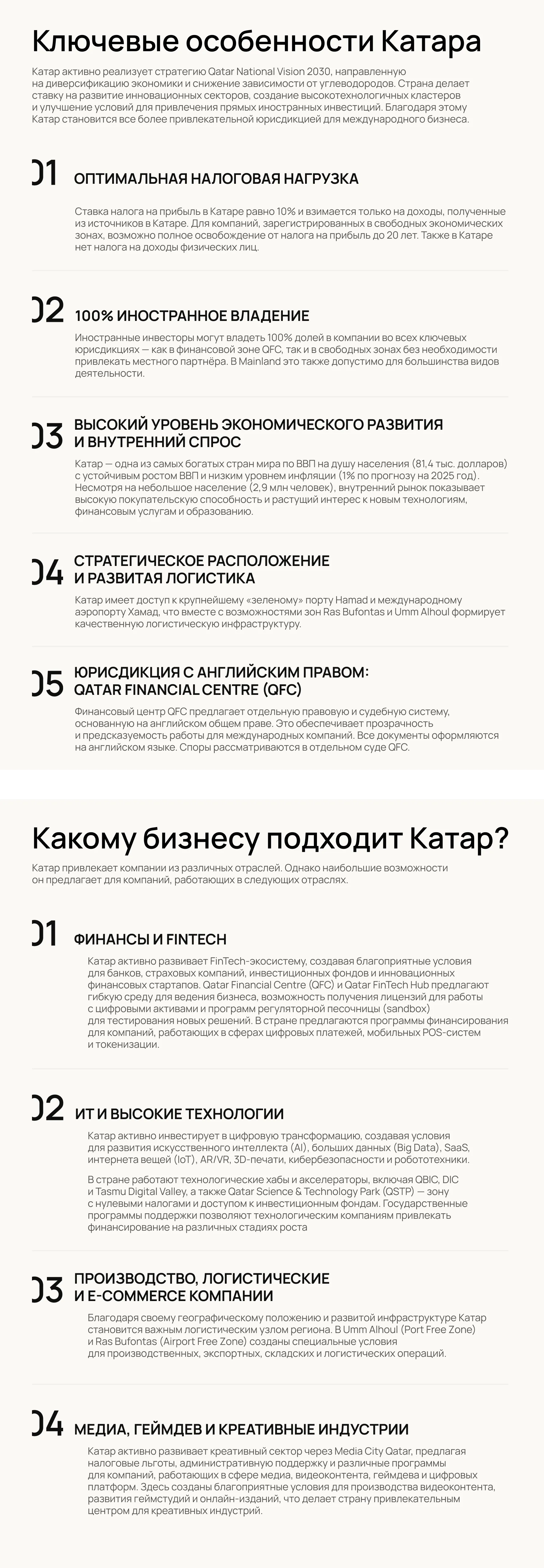Taxes and accounting
Main taxes and fees in Qatar
Qatar's tax system is one of the most favorable in the world, making the country an attractive destination for living and doing business.
Contact us

Overview
However, considering global trends toward greater tax transparency and the fight against tax avoidance, this system may change in the future.
VAT
Currently, Qatar does not have VAT. However, Qatar has been part of the VAT Agreement of GCC states since 2023. The government is considering introducing VAT in the future, with the expected rate set at 5%.
VAT GCC Agreement: How Arab Countries Integrate Regional Tax into Their Economies
In 2016, the Gulf Cooperation Council (GCC) member states signed a Unified VAT Agreement.
The agreement aims to diversify economies: in GCC countries, where oil and gas account for up to 80% of the budget, VAT has become a tool to finance infrastructure, healthcare, and education.
Each GCC country retained the right to adapt the rules to its own needs:
- Saudi Arabia and UAE introduced VAT in 2018
- Bahrain in 2019
- Qatar and Oman joined later in 2023
“Overall, the introduction of VAT in Qatar is an inevitable step in the country’s tax system development. While it may cause short-term economic challenges, in the long term, it will help stabilize government revenues and support economic diversification.” Artur Faniev Commercial Director
Corporate Income Tax (CIT)
Qatar’s tax system is designed to attract foreign investment while maintaining strict rules for companies working with natural resources. CIT in Qatar has a unique structure depending on two factors:
- Nationality of business owners (Qatari citizens or foreigners)
- Business activity (oil & gas sector or other industries)
Who Pays and at What Rates
- 10% CIT → applies to most companies (e.g., trade, IT, other services)
- 35% CIT → applies to companies with foreign ownership in the oil & gas sector and those involved in natural resource extraction
Foreign companies must pay CIT. Remote companies or those operating via intermediaries are taxed only if they have a permanent establishment in Qatar.
Example:
- A foreign IT company with an office in Doha pays 10% CIT on income from Qatar.
- A foreign IT company serving Qatari clients remotely, with no physical presence in Qatar, pays no tax.
Tax Base
Tax applies to income sourced from Qatar and certain income from outside Qatar, including:
- Rental income
- Royalties
- Interest
- Technical services fees
Income remains subject to CIT if linked to a permanent establishment in Qatar, such as:
- Rights for distribution of goods and services
- Marketing services
- Intermediary services
- Guarantees or financial support
- Broadcasting or communications services
Tax Period
The tax period matches the company’s financial year. Companies can choose their fiscal year-end (e.g., December 31, March 31, or any other date).
Global Minimum Tax
From 2025, Qatar introduces a Global Minimum Corporate Tax at 15% (Domestic Minimum Top-up Tax, DMTT) for multinational corporations with annual revenue exceeding 3 billion QAR (~780 million EUR) under the OECD BEPS 2.0 Pillar Two reform.
“The global minimum tax is a new international standard developed by the OECD under the BEPS 2.0 project (Base Erosion and Profit Shifting). Its goal is to set a minimum corporate tax rate for large multinational companies to prevent the use of low-tax jurisdictions.” Alexandra Kurdyumova Co-Founder, Senior Partner
CIT Registration
Companies must register for CIT within two months after incorporation. Penalty for late registration: 20,000 QAR
CIT Exemptions
- Companies fully owned by Qatari citizens (except those in oil & gas)
- Companies in certain Qatar Free Zones enjoy full CIT exemption for up to 20 years
Withholding Tax (WHT)
Withholding tax is a mandatory deduction from payments to non-residents.
Who Pays
- Residents: Qatari companies paying non-residents
- Companies in Qatar Financial Centre (QFC) or Qatar Science & Technology Park (QSTP) may be exempt from WHT
- Non-residents: entities without a permanent establishment in Qatar but receiving Qatari-sourced income
If a non-resident has a permanent establishment in Qatar, WHT is not applied; income is taxed under CIT at 10% or 35%.
Rate
5% WHT in Mainland Qatar
Tax Base
- Service fees
- Royalties
- Dividends (not taxed if already derived from taxed profits or exempt companies)
- Interest on loans, bonds, or credits
- Commissions
Personal Income Tax (PIT)
One of Qatar’s key features is the absence of personal income tax for both citizens and foreign residents.
Some companies may require social insurance contributions under corporate policies, but this is regulated separately.
Note: If an individual operates a business in Qatar and earns Qatar-sourced income, that income may be taxed under CIT rules.
A full roadmap for launching and running a business in Qatar — in our guide 'How to Do Business in Qatar?'
In the guide, you will find not only basic information but also expert recommendations based on real cases and deep knowledge of the jurisdiction:
- Which types of businesses are best suited for Qatar
- Key steps to launching a business in Qatar
- Detailed descriptions of the processes for starting a business in Qatar’s free zones and Mainland
Related services
Ready to discuss your project?
Leave a request, and we will contact you to clarify details:
- We will choose the right activity type and jurisdiction
- Outline all steps for company setup
- Provide clear timelines and project budget

.webp)














